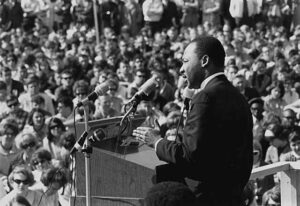Six fundamental principles guided Dr. Martin Luther King’s mission
By Elliott Brack
Editor and publisher, Gwinnett Forum
NORCROSS, Ga. | As we move to observe Martin Luther King Day on Monday, it’s fitting to review the King Philosophy. Dr. King viewed three evils, that of poverty, racism and militarism that he said formed a vicious cycle. He felt these were intertwined and were barriers for reaching his nirvana, what he called the “Beloved Community.”
 Let’s look at his thoughts in this area, this taken from his view as recorded at The King Center in Atlanta and available on the Internet.
Let’s look at his thoughts in this area, this taken from his view as recorded at The King Center in Atlanta and available on the Internet.
Fundamental tenets of Dr. King’s philosophy of nonviolence are described in his first book, Stride Toward Freedom. The six principles include:
PRINCIPLE ONE: Nonviolence is a way of life for courageous people. It is active nonviolent resistance to evil. It is aggressive spiritually, mentally and emotionally.
PRINCIPLE TWO: Nonviolence seeks to win friendship and understanding. The end result of nonviolence is redemption and reconciliation. The purpose of nonviolence is the creation of the Beloved Community.
PRINCIPLE THREE: Nonviolence seeks to defeat injustice, not people. Nonviolence recognizes that evildoers are also victims and are not evil people. The nonviolent resister seeks to defeat evil not people.
PRINCIPLE FOUR: Nonviolence holds that suffering can educate and transform. Nonviolence accepts suffering without retaliation. Unearned suffering is redemptive and has tremendous educational and transforming possibilities.
PRINCIPLE FIVE: Nonviolence chooses love instead of hate. Nonviolence resists violence of the spirit as well as the body. Nonviolent love is spontaneous, unmotivated, unselfish and creative.
PRINCIPLE SIX: Nonviolence believes that the universe is on the side of justice. The nonviolent resister has deep faith that justice will eventually win. Nonviolence believes that God is a God of justice.
 Once stating his principles, Dr. King then went forward with six steps to achieve non-violent social change.
Once stating his principles, Dr. King then went forward with six steps to achieve non-violent social change.
- INFORMATION GATHERING: To understand and articulate an issue, problem or injustice facing a person, community, or institution you must do research. You must investigate and gather all vital information from all sides of the argument or issue so as to increase your understanding of the problem. You must become an expert on your opponent’s position.
- EDUCATION: It is essential to inform others, including your opposition, about your issue. This minimizes misunderstandings and gains you support and sympathy.
- PERSONAL COMMITMENT: Daily check and affirm your faith in the philosophy and methods of nonviolence. Eliminate hidden motives and prepare yourself to accept suffering, if necessary, in your work for justice.
- DISCUSSION/NEGOTIATION: Using grace, humor and intelligence, confront the other party with a list of injustices and a plan for addressing and resolving these injustices. Look for what is positive in every action and statement the opposition makes. Do not seek to humiliate the opponent but to call forth the good in the opponent.
- DIRECT ACTION: These are actions taken when the opponent is unwilling to enter into, or remain in, discussion/negotiation. These actions impose a “creative tension” into the conflict, supplying moral pressure on your opponent to work with you in resolving the injustice.
- RECONCILIATION: Nonviolence seeks friendship and understanding with the opponent. Nonviolence does not seek to defeat the opponent. Nonviolence is directed against evil systems, forces, oppressive policies, unjust acts, but not against persons. Through reasoned compromise, both sides resolve the injustice with a plan of action. Each act of reconciliation is one step closer to the ‘Beloved Community.’
Martin Luther King, 1929-1968: Thank you for these words and this guidance.
- Have a comment? Send to: elliott@brack.net









Follow Us